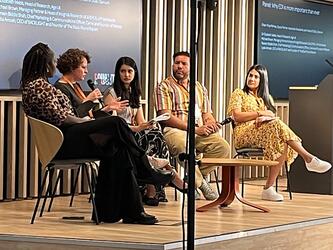Little improvement in EDI in insight industry, says survey

In the report Who do we think we are?, the council said that its research found 21% of respondents thought the market research industry was ‘fair’ compared with 40% who felt it was unfair – both similar figures to 2022’s version of the survey.
The survey was designed and carried out by Savanta and ran online between 2nd October and 4th November 2024, featuring 771 respondents from a self-selecting sample.
Almost all workplace attributes tracked by the research saw a decline from the last time the survey was undertaken, with the report concluding that the overall experience of workplaces in the industry was not as positive in 2024 as it was in 2022.
The major areas of decline noted in the report included that people were less likely to feel they belong or are emotionally supported at work, fewer respondents see EDI being taken seriously in their organisation, people were less likely to see progression being offered, and perceptions that managers were adopting fair policies when hiring staff also fell.
However, the report posited some potential mitigating circumstances, including that in 2022, people were returning to the workplace after Covid-19, which may have helped with feelings of belonging, and also that over the last two years wages have also grown at a slower pace than inflation, also contributing to an overall feeling of dissatisfaction.
The report noted that there was an 89% increase in people answering ‘yes’ to any of the discrimination statements since the research was last carried out, with 36% of respondents saying they had experienced some form of discomfort, lack of inclusion or discrimination in the previous year in 2024 compared with 19% in 2022.
Workplace culture in market research had not improved since 2022, according to the survey, although 82% felt they were a valued and essential part of their direct team and 70% felt they belong at their company.
Despite falls in all of the scores this year, being recognised for work well done (eight percentage point drop), being socially supported at work ( 11 percentage point drop) and being given opportunities to learn and progress ( 10 percentage point drop) suggested that work has become more transactional since 2022, where the focus has been getting the work done in a difficult economic climate, the report said.
The report added that “greater recognition that people make great teams and that teams deliver brilliant work” should rebalance the current slide seen in the data.
There were also significant falls seen in respondents agreeing that hiring and career advancements is fair in their workplace, down from 66% in 2022 to 55% in 2024.
Additionally, there were declines in respondents feeling comfortable being themselves at work (down six percentage points to 71%) and employers actively supporting women and minority group employees (down five percentage points to 65%).
However, most of the sample said they were able to work flexibly ( 89%) and felt comfortable speaking about causes they believe in at work ( 70%).
There was also an increase in people being willing to act as an ‘ally’, up from 65% to 70% in the latest survey.
Writing in the report, Dr Mark Thorpe, chair of MRS Inclusion Pledge Committee and incoming chair of MRS EDI Council, said: “EDI has suffered a kind of ‘blow-back effect’. Its relative success, albeit over a short period of time, has led to a counter response. EDI is seen as the ‘problem child’; a catalyst for making things worse rather than better. This is undoubtedly the wrong interpretation, but it is something we need to recognise and deal with.
“The reality is that EDI is about all of us. Every. Single. Person. When companies fail EDI, they fail us all. This is the sentiment and energy we need to harness. Until we do, figures such as those contained in this report will be saddening but not surprising. For everyone and all of us.”
Jane Frost, chief executive at MRS, said: “Here at MRS, we are staying the course on ED&I and this research shows that we need to maintain the commitment. I’m glad the research did show that our efforts are being recognised – even more delighted that we can showcase our networks such as in the joyous event of MRSPride participation in London Pride.
“The economy is undoubtedly unhelpful – but that means we need to refocus our messages on the value of being an inclusive sector.”
Access the report Who do we think we are?.

We hope you enjoyed this article.
Research Live is published by MRS.
The Market Research Society (MRS) exists to promote and protect the research sector, showcasing how research delivers impact for businesses and government.
Members of MRS enjoy many benefits including tailoured policy guidance, discounts on training and conferences, and access to member-only content.
For example, there's an archive of winning case studies from over a decade of MRS Awards.
Find out more about the benefits of joining MRS here.














0 Comments